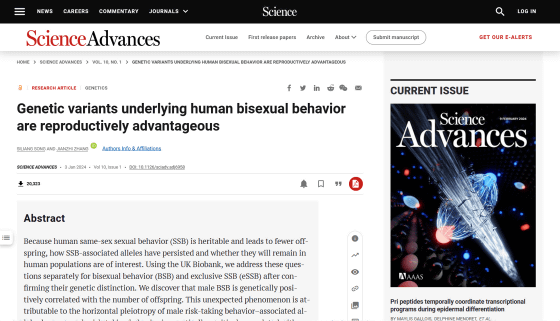Research results show that heterosexual men with ``bisexual genes'' have more children

Among animals that produce offspring through sexual intercourse between females and males, intercourse between members of the same sex has no direct reproductive significance. However, because genes related to homosexuality and bisexuality were not eliminated during the evolutionary process, some researchers believe that homosexual behavior may also have some evolutionary advantage. A University of Michigan study published in the journal Science Advances in January 2024 found that 'heterosexual men with genes associated with bisexuality have more children.' .
Genetic variants underlying human bisexual behavior are reproductively advantageous | Science Advances

Genetic variants underlying male bisexual behavior, risk-taking linked to more children, study shows | University of Michigan News
https://news.umich.edu/genetic-variants-underlying-male-bisexual-behavior-risk-taking-linked-to-more-children-study-shows/
Straight Men With 'Bisexual Genes' Have More Kids, Study Finds : ScienceAlert
https://www.sciencealert.com/straight-men-with-bisexual-genes-have-more-kids-study-finds
The research team analyzed data from more than 450,000 Europeans from the UK Biobank , a long-term British study, to examine genes and reproductive activity associated with bisexual behavior in humans. The data included information such as the subject's DNA sequence and number of children, as well as answers to questions such as ``Do you consider yourself a risk taker?''
The analysis revealed that heterosexual men with a genetic variation called the bisexual behavior (BSB)-associated allele have more children than average. They also found that men who described themselves as 'risk takers' were more likely to have more children, and were also more likely to carry BSB-related alleles.
This suggests that BSB-related alleles are associated with both bisexual behavior and risk-taking behavior in men, which may confer reproductive benefits. .
'Our results suggest that male BSB -associated alleles are likely to have a reproductive advantage. 'This may explain why genes associated with bisexual behavior have persisted and are predicted to persist in the future.'

In general, risk-taking tendency refers to the tendency to engage in reward-seeking behavior regardless of whether it is successful. Although the UK Biobank survey did not examine the details of risk-taking behavior, those who answered that they were risk-takers were more likely to engage in risky behavior such as having unprotected sex. , they may end up having more children.
On the other hand, heterosexual men who carried the allele associated with exclusive homosexual behavior (eSSB) tended to have fewer children. Based on these results, it is predicted that the number of people with eSSB-related alleles will decrease over time. However, this study focused only on the genetic basis of bisexual and homosexual behavior, and did not investigate the influence of environmental factors on these sexual behaviors.
'We're talking about three traits here: number of children, risk-taking behavior, and bisexual behavior, all of which share some genetic underpinnings,' said Chan. suggest that the underlying reason why BSB-related alleles promote reproduction in heterosexuals is risk-taking behavior; that is, the reproductive advantage of BSB-related alleles It's a by-product of the reproductive advantage of the actions we take.'

Related Posts:
in Science, Posted by log1h_ik







